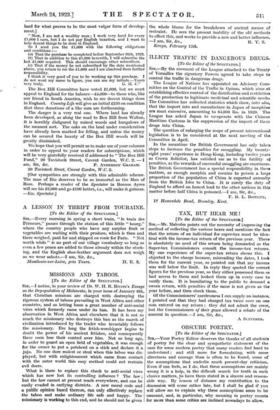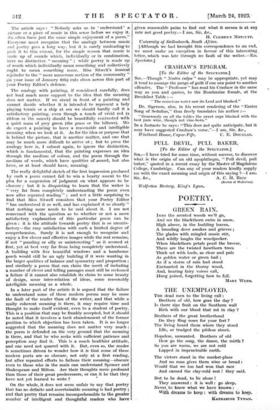OBSCURE POETRY.
[To the Editor of the SPECTATOR.] Srn,—Your Poetry Editor deserves the thanks of all students of poetry for the clear and sympathetic statement of the case for some modern poetry that many readers find hard to understand : and still more for formulating, with more directness and courage than is often to be found, some of the assumptions that underlie much present-day criticism. Even if one feels, as I do, that these assumptions are mainly wrong it is a help, in the difficult search for truth in such elusive matters, to have them stated in a sincere and reason- able way. By reason of distance my contribution to the discussion will come rather late, but I shall be glad if you will allow me to explain why these assumptions seem to be unsound, and, in particular, why meaning in poetry counts for more than some critics are inclined nowadays to allow. The article says : " Nobody asks us to ' understand' a picture or a piece of music in this sense before we enjoy it. We often have just the same simple enjoyment of a poem." Everyone must recognize that the analogy between music and poetry goes a long way, but it is surely misleading to push it to this extent, for the simple reason that music is made up of sounds which, individually or in combination, have no distinctive " meaning " ; while poetry is made up of words which individually mean something and collectively ought to mean something more. Miss Sitwell's ironical rejoinder to the " more numerous section of the community " (in your issue of January 6th) cuts clean across this part of your Poetry Editor's defence.
The analogy with painting, if considered carefully, does not lend much more support to the idea that the meaning does not matter. If we stand in front of a painting and cannot decide whether it is intended to represent a lady playing tennis or a ship at sea we should hardly call it a satisfactory painting, even though a touch of vivid red (a ribbon or the sunset) should be beautifully contrasted with a quiet mass of grey green (the grass or the billows). We do expect a painting to have a reasonable and intelligible meaning when we look at it. As for the idea or purpose that is behind the picture, that is another matter, and one that may be much more difficult to arrive at ; but to press the analogy here is, I submit again, to ignore the distinction, which is fundamental, that the painting expresses an idea through the medium of colour, and the poem through the medium of words, which have qualities of ,sound, but also have, or at least should have, meaning.
The really delightful sketch of the first impression produced by such a poem cannot fail to win a hearty assent to the plea for a suspension of judgment on what appears to be obscure ; but it is disquieting to learn that the writer is " very far from completely understanding the poem even now after repeated reading " ; and not a little surprising to find that Miss Sitwell considers that your Poetry Editor " has understood it so well, and has explained it so clearly " that nothing more needs to be said about it. I am not concerned with the question as to whether or not a more satisfactory explanation of this particular poem can be given : it is the attitude towards poetry that is so unsatis- factory—the easy satisfaction with such a limited degree of comprehension. Surely it is not enough to recognize and enjoy a few clever and effective images while the rest remains, if not " puzzling or silly or uninteresting " as it seemed at first, yet at best very far from being completely understood. A building with five beautiful windows and a handsome porch would still be an ugly building if it were wanting in the larger qualities of balance and symmetry and proportion ; and similarly a poem that can claim the merit of including a number of clever and telling passages must still be reckoned a failure if it cannot also establish its claim to some beauty of design, some inter-relation of ideas, some reasonably intelligible meaning as a whole.
In a later part of the article it is argued that the failure to understand some of these modern poems may be more the fault of the reader than of the writer, and that while a really coherent meaning is there, it may require time and thought to make itself evident, even to a student of poetry. This is a position that may be frankly accepted, but it should be noted that it involves a tacit abandonment of the former position to which objection has been taken. It is no longer suggested that the meaning does not matter very much the poem is defended on the very ground that the meaning is there, and that he who seeks with sufficient patience and perception may find it. This is a much healthier attitude, and one need not quarrel with it. But, even so, the reader is sometimes driven to wonder how it is that some of these modern poets are so obscure, not only at a first reading, but after repeated efforts to fathom their meaning—obscure even to those who in the main can understand Spenser and Shakespeare and Milton. Are their thoughts more profound than those of their great predecessors, or can it be that they have not yet learned to write ?
On the whole, it does not seem unfair to say that poetry that has no definite and ascertainable meaning is bad poetry ;
and that poetry that remains incomprehensible to the greater number of intelligent and thoughtful readers who have
given reasonable pains to find out what it means is at any rate not good poetry.—I am, Sir, &c.,
IL CLEMENT NOTCUTT.
University of Stellenbosch, South Africa.
[Although we had brought this correspondence to an end, • we must make an exception in fasFour of this interesting letter, which was late through no fault of the writer.—En. Spectator.]



































































 Previous page
Previous page